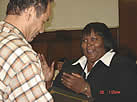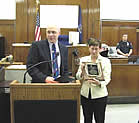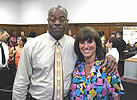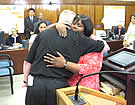Manhattan Treatment Court (Felony)
Graduates
Frederick Douglas said, “If there is no struggle, there is no progress. Those who profess to favor freedom, and deprecate agitation, are men who want crops without plowing up the ground, they want rain without thunder and lightning.” Addiction and sobriety may be a battle that you fight for the rest of your life. Remember you only lose if you stop fighting.
Debra Hall-Martin,
Project Director II,
MTC/MMTC
A Success Story
The dictionary defines success as a favorable, or satisfactory outcome, or result. This is Salvatore Pirone’s success story, or Sal as MTC referred to him. Mr. Pirone was referred to the Manhattan Treatment Court (MTC) on November 14, 2004, after having plead guilty to Attempted Criminal Sale of a Controlled Substance in the 3rd Degree. At the time he was 51 years old.
He had been abusing heroin off-and-on for the past 32 years, abusing cocaine, on 80mg of methadone, lived with his mother, and did not have a high school diploma or GED. With all of that going on, he somehow managed to maintain employment at Verizon for the past 23 years. The challenge would be developing a treatment plan to address his substance abuse needs, save his job, and pension.
MTC started out by referring him to detox and rehab since he was still actively using heroin and cocaine. Due to the arrest and subsequent administrative discharge, the methadone clinic was decreasing his methadone dosage 10mg per week, which was not sustaining him. Referring him for detox and rehab required going through his insurance carrier which was not in agreement with the courts recommendation. After cutting through the red tape, MTC was able to place him in a detox and rehab. Four (4) days after he completed the rehab, he relapsed.
The next step MTC took was to get his employer involved. We had Mr. Pirone contact the Employee Assistance Program (EAP) at Verizon. We required Mr. Pirone to sign a consent enabling us speak to Verizon. We wanted to save his job, but his job was becoming less important as his usage spiraled out of control. He was sanctioned, with a remand, until we could work on a placement with EAP. While he was incarcerated, he was detoxed off of methadone. In collaboration with the EAP unit, he was referred to a short stay three month residential program at St. Christopher’s, an EAP affiliate. EAP promised that his job would be secure and that when he completed St. Christopher’s, he could return to work.
Mr. Pirone did very well at St. Christopher’s and after he completed, he was referred to LESC’s evening outpatient program in May 2005. LESC gave him the flexibility to attend late evening groups after work. Within a month, Mr. Pirone relapsed and stopped reporting. A warrant was issued and he returned three days later. He was remanded and MTC began the process to refer him to long term residential treatment.
In August 2005, after being in jail for fifteen days, Mr. Pirone was released to enter Daytop’s six month residential program. Now with his addiction being addressed, he started to have problems with his employer. Verizon considered Mr. Pirone as abandoning his job and terminated him. Termination meant no pension, or benefits.
MTC worked with his defense attorney and his union to try to remedy the problem. Daytop allotted him extra visits to meet with his attorney to fight his employment termination. His claim was denied and his attorney promised she would appeal. Mr. Pirone continued to work on himself and was counseled on how to confront disappointments and losses in life. In addition, now jobless, Mr. Pirone was preparing himself to re-enter the job market at 52 years of age. He obtained his GED in December of 2005.
Mr. Pirone completed six months of residential treatment upstate and was transferred to the city for re-entry. Given the loss of his employment, he was referred to NADAP for employment assistance in July 2006. By August, NADAP had linked him with a job at Gristedes working part-time. His attorney also won the appeal and he was going to receive his pension benefits.
Everything seemed to be going well for Mr. Pirone, then he was dealt another blow. He moved out of residential treatment on 10/17/06, and his mother suffered a major heart attack on 10/18/06. This was the first trial to test his recovery. Mr. Pirone was mentally and physically clean by now, and he knew he didn’t need to use heroin to get through this. Fortunately, his mother made a full recovery and Mr. Pirone courageously maintained his sobriety through the whole ordeal.
In February 2007, Mr. Pirone received his first pension check. The income from his pension, plus the earnings from his part-time job, calculated to enough funds to sustain him financially. Along with completing the program and obtaining his GED, on February 14th, he was given a Valentine’s Day gift of a dismissal.
Mr. Pirone’s story is a reinforcement of how treatment courts team approach works. Without the full investment of all the parties, Sal’s story would have probably turned out differently.
Debra Hall-Martin,
Project Director II,
MTC/MMTC
Administration
60 Lafayette Street
New York, NY 10013
Phone: 646.386.4626
Fax: 212.374.1725
A Grads Poem
"We Can" In the realm of possibilities, I believe that all things are possible. And I believe that we can defeat this disease called addiction.
We Can And we will By the strength and mercy of God Be victorious in this battle Another step, another yard
We Can Look at ourselves in the mirror And say I love you Despite what we've been through
We can Just for today Hold our heads high Thankful to be alive We can Be proud of ourselves today For the sacrifices We and our loved ones have made
We can Live a life free of pain and shame Knowing that our lives Will never be the same
We Can Walk down the street WIth our heads up high No longer do we have to cry No longer do we have to die
We Can Knowing that we fought The good fight Live a good and beautiful life
We Can Continue down this road of recovery Becoming stronger everyday Learning more about ourselves As we make new discoveries
We Can And we will Stand at the pinnacle of triumph Overlooking Our new lives of purpose and promise
We Can And we will Continue to stand firm From the things we were taught The things we learned We Can And we will
Be all that we can be And thank God for setting us free. Amen
By Alvin Floyd
Graduation Pictures









